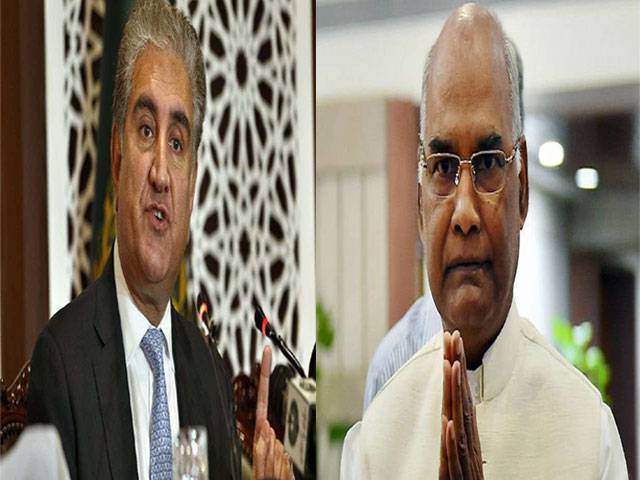Lahore - Pakistan on Saturday denied permission to the Indian President Ram Nath Kovind’s aircraft to overfly to Europe in protest against unending Indian oppression on Kashmiris, who are facing curfew for last 34 days.
“We had received request from Indian president. He is going to Iceland and wanted to use our airspace. Today, Pakistan has decided that we will not allow Indian president to use our airspace,” Foreign Minister Shah Mehmood Qureshi said.
He said the Indian attitude regarding Kashmir was totally against the human values and it was obsessed with its fanaticism despite Pakistan moving ahead prudently.
“Pakistan has decided that in these circumstances, when it (India) is using oppression, violence, abrogating fundamental laws, breaching people’s rights and has put the Kashmiri leadership behind bars, Pakistan cannot allow Indian president to use our airspace,” he stated.
The Indian president is scheduled to leave for three-nation visit to Iceland, Switzerland, and Slovenia from September 9th to 17th, according to Indian media.
No Indian official reaction over this move was available till the filing of this report.
Longer route
Schedule flights’ flight plan is cleared in advance by all countries they fly over. For special flights and charters (which are not schedule flights), permission is sought via diplomatic channels from various countries on the flight path. Such permissions are usually granted.
After Pakistan’s refusal to the Indian request, the Indian President’s flying time to and from Europe will increase by 50 minutes as it will tentatively take the following route: Delhi-near Mumbai-Arabian Sea (steering clear of Pakistan airspace around Karachi) — Muscat — and then to Europe. In case of a straight path, the plane would have gone from Delhi to Pakistan-Afghanistan-Iran and then Europe.
Earlier, Pakistan closed its airspace to scheduled Indian air flights on February 27 after aerial dogfights that month raised tensions between Islamabad and New Delhi. It reopened its skies for all civilian traffic after 138 days in July 16.
Indian oppression
On August 5, India’s Hindu nationalist government led by Prime Minister Narendra Modi revoked a special constitutional status accorded to Indian-occupied Kashmir, imposing a communications blackout and deploying thousands of troops to the Muslim-majority state, where a rebellion has been ongoing for 30 years.
Amid a strict lockdown, hundreds of activists and political leaders, including three former chief ministers, have been detained by Indian authorities in recent weeks.
Islamabad responded by downgrading its diplomatic ties with New Delhi in August, expelling the Indian envoy, suspending trade and calling back its ambassador in a deepening row over New Delhi’s clampdown in IOK. It also called for the international community to intervene and vowed to take the matter to the United Nations Security Council.
Contacts with world over Kashmir
To a question, Foreign Minister Shah Mehmood Qureshi said on Saturday that Pakistan was in contact with all international organisations and during his upcoming visit to Geneva he would meet the permanent representatives of the OIC member countries there.
In a related development, the foreign minister held a telephonic conversation with EU Special Representative for Human Rights Eamon Gilmore and discussed the growing scale and gravity of the human rights violations in Indian occupied Jammu and Kashmir for the past five weeks.
Qureshi noted that India’s illegal and unilateral actions not only contravened international law, they had caused human suffering, shrunk democratic space and clamped down on fundamental rights and freedoms, said a Foreign Office statement.
The foreign minister called for immediate and complete lifting of the curfew, removal of restrictions on movement, peaceful assembly, provision of food and medical supplies and release of political prisoners.
He urged the European Union to speak out in support of upholding human dignity, democratic and civil rights, and the imperative for India to comply with its obligations under international human rights and international humanitarian law.
The special representative stated that he was cognizant of human rights situation and that the European Union would remain seized of the matter.






